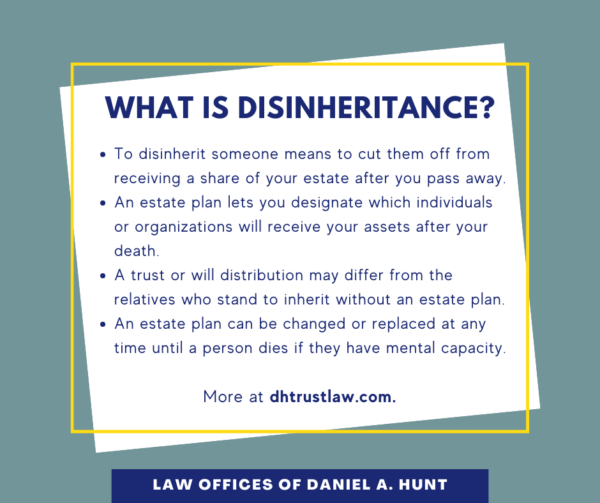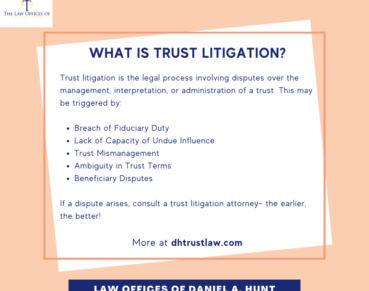What Can I Do If I Was Disinherited?

One common question we hear is: “What can I do if I was disinherited?” If your loved one disinherited you from their estate plan, you may still have options. Here’s an explanation of what it means to be disinherited and how to move forward.
What is Disinheritance?
Inheritance is the process of inheriting property from another person who has passed away. To disinherit a child means to cut them off from receiving a share of the estate after you pass away.
If a person creates an estate plan such as a will or trust, this legal document allows them to dictate how their assets will be divided after their death. They may leave their assets to family members, friends, nonprofits, or anyone else they desire. They may also exclude anyone they desire. The distribution of their estate plan overrules their “heirs at law”, meaning their blood relatives who would have inherited had they died without an estate plan.
Some people create an estate plan with the intent of disinheriting certain people. Other times, they initially include certain people and later decide to amend or replace their original document to disinherit people who were previously included in their distribution scheme. As long as they are of a sound mind, they retain the ability to amend their estate plan until the time of their death.
How to Know if You’re Disinherited
So how would you know if you were disinherited? As long as an individual is still alive, you may not know if they’ve disinherited you unless they tell you. Otherwise, this information would generally become evident after they pass away and the estate is administered.
The chosen successor trustee or executor must notify any beneficiaries and heirs at law about the estate administration and send them a copy of the trust or will within a certain amount of time. Beneficiaries of the estate and disinherited heirs both have a legal right to receive a copy of the trust or will in California.
Common Reasons for Disinheritance
The decision to disinherit a child may stem from a variety of reasons. Here are some common reasons parents opt to disinherit heirs:
- They want to leave their estate to another person or organization: Individuals have the right to leave their assets to anyone they wish, whether it be their best friend, their church, or their favorite charity.
- Lack of a close relationship: Disinheritance is common when the individual has become estranged from an heir in recent years.
- Conflict over a child’s lifestyle choices: If a parent disagrees with a child’s life choices (such as addictions) or believes them to be financially irresponsible, they may choose to legally disinherit them.
- Previous gifting: If a person has already provided significant financial help to an heir during their lifetime, they may disinherit them to even out the discrepancy.
- Alternative gifting: If the person named an heir as a beneficiary of another valuable item outside of their trust, such as a retirement account or life insurance policy, they may disinherit them.
- Special Needs Children: Children with special needs often need to be disinherited because receiving an inheritance would disqualify them from receiving government benefits. Parents could instead create a Special Needs Trust for the benefit of that child.
Whatever the reason, individuals who create an estate plan have the right to determine how they wish their assets to be distributed after their death.
Options for Disinherited Heirs
If you’re an heir and you discover that you’ve been disinherited, you may be wondering what you can do about it. Under certain circumstances, you may be able to contest the estate plan. Here are a few examples of valid reasons to do so:
- The person who created the estate plan lacked mental capacity when they signed it
- A third party persuaded the decedent to change their estate plan to favor themself (this is called “undue influence”)
- Forgery of the signature on the trust or will
- A defective document that was not drafted or executed properly
- Multiple documents have been discovered, such as two versions of a trust or will
If you wish to contest a will or trust, you should immediately seek the counsel of an experienced trust and estate litigation attorney. Time is of the essence, so do not hesitate to get an expert opinion on the strength of your case.
If you have any questions about this topic, feel free to contact our law firm.
Law Offices of Daniel A. Hunt
The Law Offices of Daniel A. Hunt is a California law firm specializing in Estate Planning; Trust Administration & Litigation; Probate; and Conservatorships. We've helped over 10,000 clients find peace of mind. We serve clients throughout the greater Sacramento region and the state of California.




